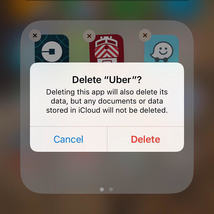 One of the most powerful things we’re witnessing right now is the momentum of the protest movements post election. Like waves, they seem to crescendo at specific moments and places, dissipate back into the populist sea, only to build back up and take new forms elsewhere. Where the Women’s March brought half a million bodies to the nation’s capital, #deleteUber amassed 200,000 customers to delete the car-sharing app off their phones. Another kind of wave. I participated in the #deleteUber campaign but I don’t think my reasons were the same as most deleters. As far as I can tell, the primary driver behind the mass delete was Uber’s allegedly taking advantage of a NYC taxi union’s temporary strike in protest of the Muslim ban. But as several outlets have reported, that isn’t what happened. So I didn’t delete at that point. I remained where I was pre-hashtag: Uber was an app I felt I should delete for a host of reasons but hadn’t gotten around to.
But then Lyft made a well-timed play for my business when it announced a $1 million donation to the ACLU. It worked. So long, Uber. Here’s the thing: While I’m certain Lyft’s donation was at least in part, if not entirely, a capitalistic decision to woo Uber customers, I don’t think that matters. Rather than punishing a company, I prefer to reward companies when they contribute to social good. Lyft made the donation, so I gave them my business. That was my rationale in the moment. I’m sure those more deeply ensconced in consumer activism, corporate social responsibility, etc. might have some critiques of that framework (which, for the record, I more than welcome). And a few days out, I have some critiques of my own as well. First, companies understand that activism sells. I don’t presume that Lyft, or any other company, makes decisions morally regardless of what they profess. They make decisions to strengthen their bottom line. I think it’s critical that consumers not be blinded by the “moral washing” many of these companies are engaged in, in order to attract business. But that said, being clear about what their intentions are doesn’t mean that as consumers we can’t welcome or reward their behavior. It seems that encouraging companies to compete to be more socially conscious than their closest competitor, even if solely for financial gain, is still generally a good thing. Second, just because a company makes the right move in one area doesn’t mean they have morally sound business practices throughout their enterprise. In fact, the larger the company, the more likely they don’t. For those looking to divest from Trump related products, Lyft, for instance, includes Trump supporters Carl Icahn and Peter Thiel amongst its investors. Since the #deleteUber campaign, Uber has set up a 3 million dollar fund to protect its workers directly affected by the ban and their founder stepped down from Trump’s economic council. While the fund is charitable, it too is self-serving – protecting their own workers means ensuring they don’t lose workers, which means Uber can continue to lead the market in terms of most drivers available to customers. It’s slightly more transparent than Lyft’s tactic, but again, I don’t think that matters much. Setting up the fund is what made me put the app back on my phone (because I wanted to reward them for taking immediate care of their drivers). As for which app I’ll actually use, that‘ll depend on what they both do next.
0 Comments
Your comment will be posted after it is approved.
Leave a Reply. |
Archives
February 2017
Categories |
 RSS Feed
RSS Feed